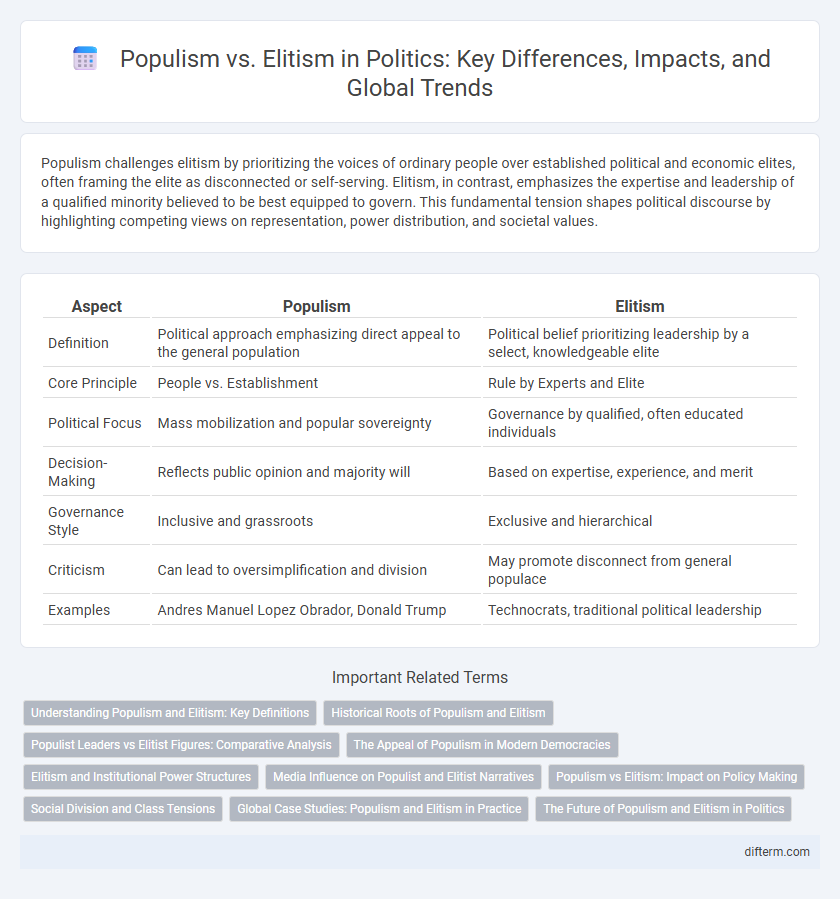Populism challenges elitism by prioritizing the voices of ordinary people over established political and economic elites, often framing the elite as disconnected or self-serving. Elitism, in contrast, emphasizes the expertise and leadership of a qualified minority believed to be best equipped to govern. This fundamental tension shapes political discourse by highlighting competing views on representation, power distribution, and societal values.
Table of Comparison
| Aspect | Populism | Elitism |
|---|---|---|
| Definition | Political approach emphasizing direct appeal to the general population | Political belief prioritizing leadership by a select, knowledgeable elite |
| Core Principle | People vs. Establishment | Rule by Experts and Elite |
| Political Focus | Mass mobilization and popular sovereignty | Governance by qualified, often educated individuals |
| Decision-Making | Reflects public opinion and majority will | Based on expertise, experience, and merit |
| Governance Style | Inclusive and grassroots | Exclusive and hierarchical |
| Criticism | Can lead to oversimplification and division | May promote disconnect from general populace |
| Examples | Andres Manuel Lopez Obrador, Donald Trump | Technocrats, traditional political leadership |
Understanding Populism and Elitism: Key Definitions
Populism centers on appealing to the general population by emphasizing popular sovereignty and often opposing established elites, while elitism promotes governance by a select group considered superior in expertise or status. Populism thrives on narratives contrasting "the people" against "the elite," fostering inclusive or exclusionary political strategies. Elitism relies on hierarchical structures, asserting that informed, privileged individuals or groups are best suited to make policy decisions.
Historical Roots of Populism and Elitism
Populism and elitism trace their origins to distinct historical contexts, with populism emerging prominently in 19th-century movements that championed the common people against perceived aristocratic or political elites. Elitism, conversely, is rooted in classical philosophies that emphasize the superiority of a select group based on education, wealth, or social status ruling for societal order. These ideological frameworks have shaped political discourses globally, reflecting ongoing tensions between popular sovereignty and hierarchical governance.
Populist Leaders vs Elitist Figures: Comparative Analysis
Populist leaders often mobilize mass support by appealing directly to popular grievances, emphasizing anti-establishment rhetoric and promising radical reforms that challenge traditional power structures. In contrast, elitist figures prioritize expertise, institutional stability, and gradual policy changes, frequently relying on technocratic governance and established networks within political and economic elites. Comparative analysis reveals that populist leadership thrives on emotional resonance and mass mobilization, while elitist approaches focus on pragmatic decision-making and maintaining established hierarchies.
The Appeal of Populism in Modern Democracies
Populism in modern democracies gains traction by framing political discourse as a struggle between the virtuous common people and a corrupt elite, resonating with widespread public dissatisfaction and economic inequalities. This appeal is amplified by charismatic leaders who promise direct representation and challenge established institutions perceived as disconnected from popular concerns. Social media platforms further boost populist movements by enabling rapid dissemination of simplified messages and mobilizing grassroots support against perceived elitism.
Elitism and Institutional Power Structures
Elitism in politics emphasizes the concentration of power within established institutional structures, often privileging a select group of individuals who control key decision-making processes. This approach argues that expertise and experience within elite circles ensure stability and effective governance, contrasting with populist demands for direct appeal to the masses. Institutional power structures, such as bureaucracies and political hierarchies, reinforce elitist dominance by limiting widespread participation and maintaining existing social hierarchies.
Media Influence on Populist and Elitist Narratives
Media outlets play a pivotal role in shaping public perception of populist and elitist narratives by amplifying emotional appeals or expert opinions, respectively. Populist movements often harness social media platforms to bypass traditional gatekeepers, fostering direct engagement and mobilizing grassroots support. In contrast, elitist perspectives typically gain traction through established news organizations that emphasize factual reporting and institutional credibility.
Populism vs Elitism: Impact on Policy Making
Populism emphasizes direct representation of the common people's interests, often challenging established elites and traditional institutions, which can lead to more inclusive but sometimes volatile policy making. Elitism prioritizes expertise and experience, favoring policies crafted by a select group of knowledgeable individuals, potentially enhancing stability but risking disconnect from broader public concerns. The tension between populism and elitism shapes legislative agendas, influencing the balance between democratic responsiveness and technocratic governance in political systems.
Social Division and Class Tensions
Populism often intensifies social division by framing politics as a struggle between the "common people" and a disconnected elite, exacerbating class tensions and undermining social cohesion. Elitism, by emphasizing governance by a privileged few, risks alienating large segments of the population, deepening feelings of exclusion and resentment among lower socioeconomic groups. Both dynamics can polarize societies, making consensus-building and inclusive policy-making more difficult.
Global Case Studies: Populism and Elitism in Practice
Populism thrives on mobilizing mass public discontent by challenging entrenched elites, as exemplified by Brazil's Jair Bolsonaro and Hungary's Viktor Orban, who leverage nationalist rhetoric to consolidate power. Conversely, elitism upholds technocratic governance and expert-driven decision-making, characteristic of countries like Singapore, where policy stability prioritizes economic growth over broad populist appeals. These contrasting approaches highlight the tension between direct popular engagement and centralized elite control across diverse political landscapes.
The Future of Populism and Elitism in Politics
Populism continues to gain traction by appealing directly to widespread public discontent, challenging traditional elitist structures perceived as detached from everyday concerns. Elitism, however, maintains influence through institutional power and expertise, often shaping policy behind the scenes. The future of politics may see a dynamic interplay where populist movements push for greater transparency and inclusivity, while elitist frameworks emphasize stability and informed decision-making.
populism vs elitism Infographic

 difterm.com
difterm.com